Search
Showing 10 of 7117 results
-
Successful agent engagement and student recruitment drive in Malaysia
The events aimed to gauge student interest in studying in New Zealand and deepen collaboration with education agents and schools.
To kick off the series, in early March, ENZ and representatives from New Zealand universities co-hosted a morning tea information session and focus group for Malaysian education agents in Kuala Lumpur.
The session promoted the ENZ resources available to support agents, and representatives from University of Auckland, University of Canterbury, Massey University, University of Otago, and University of Waikato led a discussion exploring key messages that resonate with Malaysian students and parents, understanding the factors influencing destination choice and brainstorming strategies to strengthen New Zealand’s brand visibility.
The event brought together 11 agencies from across Kuala Lumpur.
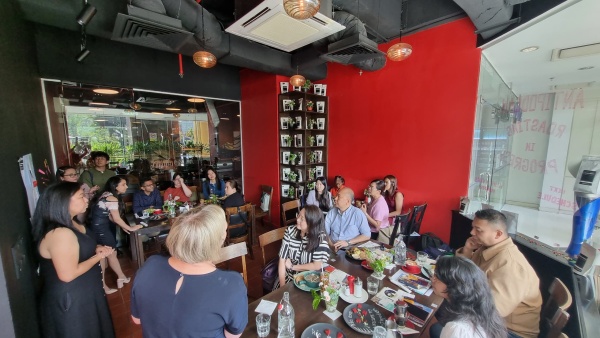
Co-funded agent activity
ENZ supported three key education agencies from across Malaysia to undertake co-funded student recruitment activity.
In Selangor, AECC Global Malaysia and ENZ hosted a mini-booth fair at HELP International School – giving students the opportunity to interact directly with representatives from Auckland University of Technology, the University of Auckland, the University of Canterbury, University of Otago, and the University of Waikato.
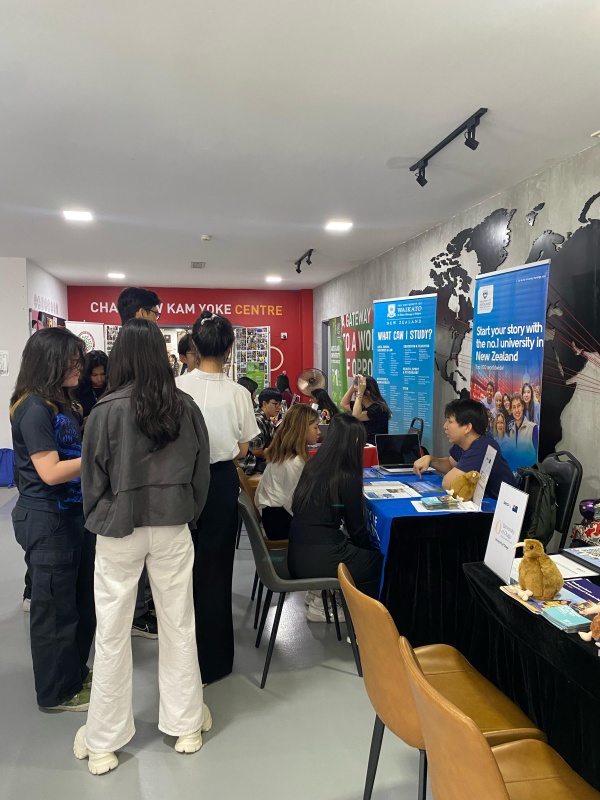
The mini-booth fair at HELP International School.
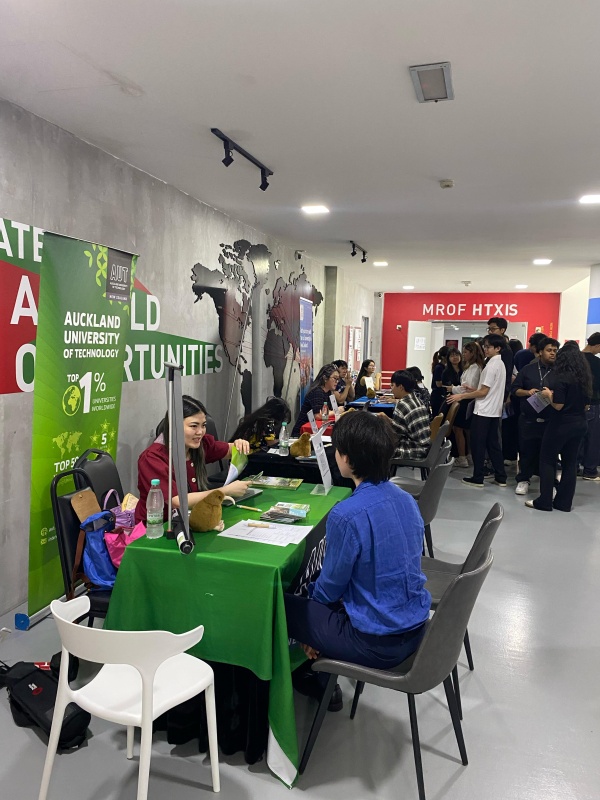
The mini-booth fair at HELP International School.
Over to Shah Alam, SELSET Education partnered with INTEC College to host an information session showcasing eight of New Zealand’s tertiary institutions.
INTEC College students heard from the Auckland University of Technology, the University of Auckland, University of Canterbury, University of Otago, University of Waikato, Southern Institute of Technology, Nelson Marlborough Institute of Technology and pathway provider, University of Canterbury International College.
Around 100 students were in attendance, and the session was followed by an opportunity for students to chat further with the study providers on show.
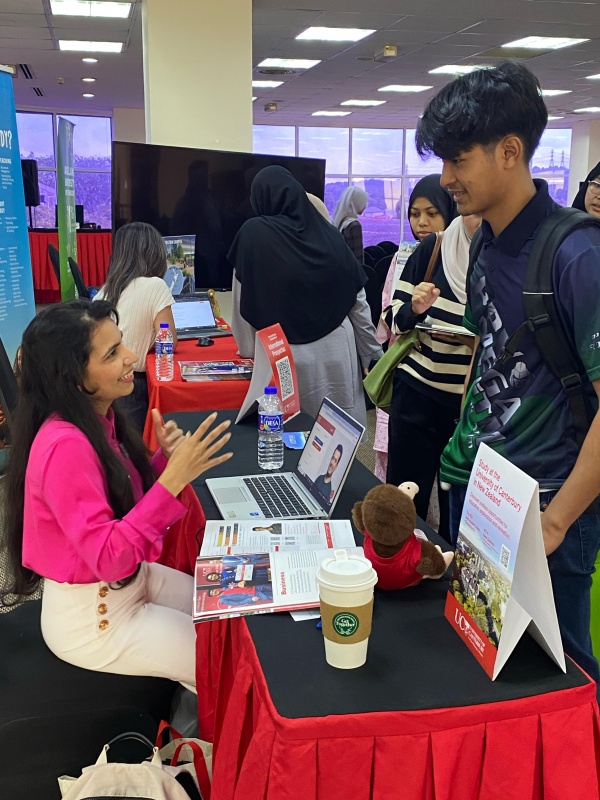
Students at INTEC College exploring New Zealand tertiary education study options.
To close out the co-funded activity, ENZ made its first official visit to East Malaysia since before the pandemic.
ENZ and JM Education partnered to lead a series of school visits in late April Kota Kinabalu, Sabah.
Around 400 students attended information sessions across three schools. The events were led by the University of Auckland and University of Otago at Kota Kinabalu High School, Sekolah Menengah Sains Sabah, and Maktab Nasional.
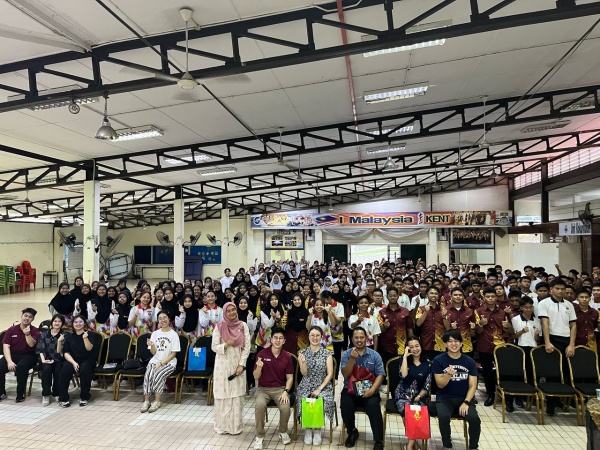
Attendees of one of the information sessions.
ENZ Market Manager for Indonesia and Malaysia, Naluri Bella, said that partnering with agents for co-funding targeted activities helps enhance both agents and students’ awareness and understanding of New Zealand’s unique education offering.
“These collaborations not only build trust and commitment among agents but also positions New Zealand as a competitive and credible choice for Malaysian students,” she said.
-
Announcing the recipients of the Welcome to New Zealand Scholarships
The initiative was warmly received across Germany, Italy, and France, where it was promoted with the goal of encouraging students to experience the world-class education and unforgettable lifestyle that New Zealand has to offer.
As part of the campaign, we offered four scholarships, each valued at 5,000 EUR to go toward tuition fees at New Zealand secondary schools or tertiary institutions. These scholarships were designed to support talented and passionate students on their journey to study abroad.
A key highlight of the campaign was our collaboration with Air New Zealand, who will generously sponsor return flights for the scholarship recipients. Their support played a pivotal role in making the dream of studying in New Zealand even more accessible for the winners.
The scholarship attracted over 200 applications – with a majority coming from Germany, followed by Italy and France.
During the campaign period, there were 19,965 total views on the Welcome to New Zealand Scholarship page on the Study with New Zealand website.
The campaign generated 172 lead enquiries to New Zealand providers (118 enquiries from Germany, 47 enquiries from France and 7 from Italy). These enquiries are sent straight on to the education providers so they can directly engage with the prospective student on their study interests.
Meet the recipients
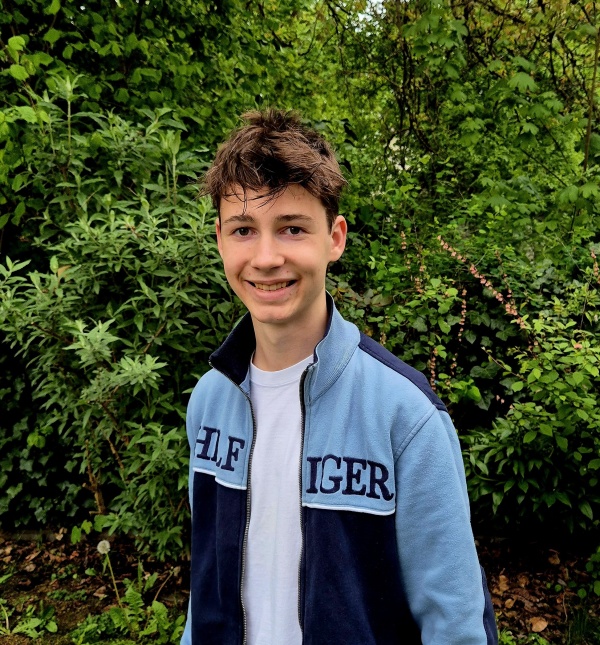
Germany
The scholarship winner from Germany is 16-year-old Manuel Fink, from Unterhaching (near Munich).
Manuel will be heading to Te Puke High School, where he’ll immerse himself in both the academic and cultural experience of studying in New Zealand.
A passionate advocate for New Zealand and its education system already, Manuel has his sights set on becoming a pilot — ideally flying for Air New Zealand one day!
Our tertiary scholarship recipient from Germany is currently finalising their enrolment, and we look forward to announcing their name once the process is complete.

Italy
Our Italian scholarship recipient is 16-year-old Lea Sagliaschi from Milan. Lea will be attending Selwyn College and is full of excitement for what she describes as a “once-in-a-lifetime adventure” in Aotearoa New Zealand.
Unfortunately, no recipient could be selected from France this year due to a lack of eligible applications — however, the ENZ Europe team remains committed to engaging with prospective students in the French market and looks forward to stronger participation in future campaigns.
ENZ Associate Director of Engagement Europe, Olga Elli, said the campaign raised great awareness of New Zealand’s education system in European priority markets and opened the door to new experiences and opportunities for winners.
“We look forward to building on this momentum and continuing to share the unique value of a New Zealand education with European students and partners,” she said.
-
New video series: Discover the inspiring journeys of New Zealand alumni
The series showcases the journeys of New Zealand alumni from across the world, highlighting the diverse paths they have taken since graduation.
Three videos have been released so far, with the remaining set to be released through the rest of this year.
Each video offers a glimpse into the personal and professional achievements of former students who have made their mark across various industries and communities.
Alumni from all levels of New Zealand’s education offering will be featured – ranging from schools to universities and vocational education providers.
These stories are designed to inspire prospective students and their families to consider New Zealand as their study destination of choice.
You can view and download the alumni videos and photos on The ENZ BrandLab. Search ‘Alumni’ to see the latest stories.
In addition, the series is supported by a new alumni blog story each month on the Study with New Zealand website and a dedicated page for Alumni stories.
Check out the series so far
Meet Yao – classical musician and cultural bridgebuilderOur first story features Chen Xiyao, a Chinese-born guzheng player and classical musician now based in Beijing. Although he earned a degree in Business Administration, it was in New Zealand where his love of music truly flourished—thanks to the support of an inspiring high school teacher. He went on to earn a Master of Arts (with Distinction) from Wintec.
From playing in a metal band to performing with Māori musicians and even entertaining former Prime Minister John Key, Yao's journey reflects the unique opportunities and cultural exchange that a New Zealand education can offer.
Today, he teaches music for Wintec in China, continuing to share his passion and talent with others.
From New Zealand to New Delhi: Suvan’s Inspirational Culinary JourneySuvan Kitchlue began his Bachelor of Culinary Arts at Le Cordon Bleu Wellington in 2015, graduating in 2018.
Inspired by MasterChef Australia in India, he chose the school for its rare offering of a culinary arts degree at that time. He thrived in the programme, calling it the “Harvard of culinary education.”
After graduating, Suvan opened a European café in New Delhi, aiming to bring refined technique and quality baked goods to a market he felt was underserved. Inspired by Wellington’s coffee culture, he also focused on elevating his café’s coffee offerings to New Delhi.
He plans to open two more café locations, and a fine-dining restaurant.
Devika Hartono: Alumni storyDevika was born in Indonesia and moved to New Zealand in 2016 on a scholarship to study Biotechnology at The University of Waikato.
Passionate about biology since high school, she sought scholarships to expand her opportunities beyond medical school or teaching. A photo of New Zealand’s stunning landscapes sparked her interest, and she was thrilled to receive both the University of Waikato International Excellence Scholarship and the High Achievement Scholarship for International Students.
After graduating, she launched Keyoura, a skincare brand inspired by the Māori greeting "Kia ora."
-
We want to hear from you!
This survey is important to gauge ENZ’s performance and importantly, hear from New Zealand international education providers on how we’re doing, what services you value and what you’d like to see more of.
Your feedback last year highlighted the value of ENZ’s branding and promotional work and offshore connections, and you wanted more data and insights to assist planning.
Since the launch of Learn New Every Day, our marketing campaign, and through optimising our media spend, we have driven significantly improved reach of New Zealand’s position as an education destination and engagement through content and connection.
Importantly, focus lies in building awareness, reputation and quality associations and ahead, we will be connecting with you to establish more effective partnership ways to amplify our joint promotional work.
ENZ underwent an organisational change process early in the new year, with the creation of the International & Sector Engagement team, which has a stronger focus on international services, with the aim of ensuring a seamless flow of market and sector intelligence to support sustainable growth in New Zealand’s international education sector.
We have held online sessions with deep dives into enrolment information, brand health and student experience to help you understand the work that ENZ does to assist your planning. We have more data and insights sessions planned in the year ahead and the survey is your opportunity to signal what else we can do to support your work.
A survey link will be sent to providers in the coming weeks. We look forward to hearing your thoughts to enable us to improve our support to the New Zealand international education sector.
Thank you in advance for your participation.
-
Around the world in five
United Kingdom
International education leaders in the UK have expressed concerns about new proposals to place a levy on the income that institutions earn from international student fees.
Global
A new global survey makes it clear that the more restrictive visa policies that have been introduced in leading destinations over the last 18 months continue to have a profound impact on international student mobility.
India
New research reveals that career advancement is the primary motivation for Indian students choosing to study abroad.
Europe
In the wake of Trump’s moves, the EU is hoping to offer a political safe haven for US scientists and academics.
Australia
Following the recent federal election in Australia, the makeup of Prime Minister Anthony Albanese’s new ministry is beginning to take shape.
-
New Zealand institutions strengthen ties with Latin American education agencies
In April, ENZ supported the Study in New Zealand Agent Seminars – an event series organised by Kiwi EdLink, a New Zealand-based organisation that represents education providers across the country.
New Zealand’s educations offerings for Latin American students were showcased to education agents at the seminars. From English language programmes for children, youth, and adults to short or long-term school studies in New Zealand.
The participating institutions from New Zealand were the Kiwi English Academy, Glendowie College and Onslow College.
ENZ teams in Santiago and São Paulo hosted networking events at the New Zealand Embassy in Chile and the Consulate in Brazil, inviting selected agents aligned with Kiwi EdLink’s strategic goals in the region.
In addition to facilitating these connections, the ENZ team also provided market insights and engaged in conversations about future steps to deepen engagement and opportunities in Latin America’s dynamic education landscape.
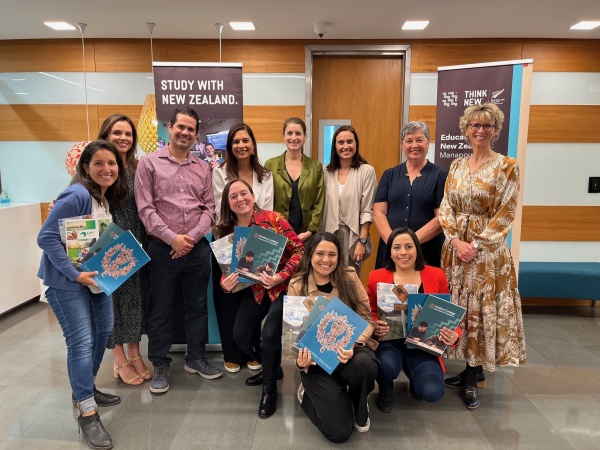
Attendees of the Study in New Zealand seminar in Santiago, Chile. This event was hosted at the New Zealand Embassy.
During the event in São Paulo, Director of Kiwi English Academy, Kathryn Herbert, said “This is a moment to reconnect with our Latin American partners so we can better understand how to offer relevant programs to Brazilian students.”
The feedback from sector attendees was positive. Director of International Students at Onslow College, Robynne Bloemstein, said that the institution is very excited to reengage with the Latin American market and welcome students from the region into its student body, which already includes 45 international students.
It was the first visit to Brazil for the Director of International Students at Glendowie College, Rebecca Johnstone. She said “We love Latin American students—we currently have 47 international students in total, including two Chilean students and a new Brazilian student starting in July. They all contribute greatly to the multicultural environment of our school.”
Check out the video report the ENZ team put together with the representatives of New Zealand schools at the São Paulo event.
-
From the CE: Purpose, Place and Partnership
Kia ora koutou,
I am pleased to report that the cross-agency work to develop an International Education Growth Plan for the Prime Minister and Ministers is progressing well.
In recent weeks, Education New Zealand has held a series of engagements with different parts of the international education sector to validate assumptions on supply and focus markets, and to better understand current system capacity and which interventions will enable quality, sustainable growth. This work continues at pace.
Last week, we were delighted to welcome to our Wellington office a visiting delegation of senior school leaders from the Incheon Metropolitan Office of Education - East Asia Global Education Institute. At the mihi whakatau, I explained the Māori phrase Nau mai and the New Zealand way of showing hospitality and care (Manaakitanga) to visitors.
The visit was a valuable opportunity to reinforce New Zealand and its education institutions as trusted partners for South Korea. I am certain their stay, which included visits to New Zealand schools and vocational training institutes, will contribute to raising awareness of the New Zealand education system in their hometowns and strengthen ties with education providers here.
Later this month I will be travelling abroad for NAFSA, the world’s largest international education conference, which will be taking place in San Diego, California. The theme this year is Purpose, Place and Partnership, and it is one that resonates in a time of global uncertainty. I am looking forward to engaging with our sector partners and team in market, as well as showcasing New Zealand’s unique education offering to the world.
He whenua auaha tātou, he whai tikanga, he whai whakaaro tonu ki te hapori.
We are a country that is creative, practical and community minded.
Ngā mihi nui,
Amanda Malu
Chief Executive
-
Update from Immigration New Zealand
Visa processing update
- From 01 January to 31 March 2025, student visas have been processed in 12 days (two and a half weeks) on average, compared to 24 days (five weeks) for the same period in 2024.
- Currently, international student visas are being decided in 10 days (two weeks) on average.
- The tertiary sector’s mid-year intake is almost upon us, and students need to apply for their visas now.
- Latest visa processing times can be found on the INZ website: Student visa wait times | Immigration New Zealand.
Reminders from Immigration New Zealand
The conditions of a student visa state that the visa holder must attend the programme of study at all times, at the place of study endorsed on the visa (unless there are genuine reasons for absences), and that they must make satisfactory progress in the programme of study.
Immigration New Zealand (INZ) receive a number of applications from students in New Zealand, who have poor attendance and/or progress, without any explanation of why.
If students do have poor attendance or progress, it is recommended that an explanation for this is provided up front with the application to avoid the need for INZ to request further information. This will prevent any delays in processing.
- All terminations of enrolment (ToE) must be submitted to INZ. This can be done through the INZ website: https://www.immigration.govt.nz/assist-migrants-and-students/assist-students/student-enrolment-termination
If you are refunding an international student’s fees, then the ToE form should be filled out, regardless of whether or not the student’s visa has been sighted by the provider.
- From 01 January to 31 March 2025, student visas have been processed in 12 days (two and a half weeks) on average, compared to 24 days (five weeks) for the same period in 2024.
-
Aotearoa sharpens Sherpa’s ambitions on conservation in Nepal
The Everest region of Nepal is his home, and he has seen first-hand the impact of climbers and climate change on the world’s most famous mountain environment.
The former international student to New Zealand is a columnist in the Kathmandu Post, readily highlighting successes and calling out failures on a range of environmental issues impacting Nepal. He is part of a generation determined to find solutions.
Tsewang recently completed his Master’s in Environmental Management at Lincoln University, an international education experience made possible by the Mingma Norbu Sherpa Memorial Scholarship. Mingma was an early graduate of Sir Edmund Hillary’s Khumjung School, an alumnus of Lincoln University, and one of the leading voices on conservation in Nepal and Bhutan through his work with World Wildlife Fund (WWF) before his untimely death in 2006.
His legacy is a scholarship jointly funded by WWF, Lincoln University, and the Greater Himalayas Foundation which supports students from remote regions of Nepal committed to careers in conservation to study at Lincoln.
Tsewang says the links with New Zealand which date back to the work of Sir Edmund Hillary, and his belief in the importance of education for future generations, are a driver for many Nepalese students seeking to improve their opportunities in life.
“The connection is very strong,” he says. “Sir Ed Hillary is such an icon and I feel that the students who come to New Zealand to study are continuing to strengthen the relationship established by Sir Ed and Mingma”.
Fulfilling the dream of a New Zealand education
“The scholarship allows you to fulfil a vision of having a higher education in New Zealand, but more than that, it connects many people already working in the conservation sector in New Zealand, Nepal, and other parts of the world.”
Tsewang spent two years in New Zealand, arriving just before the border closed in 2020 and is grateful that his studies were largely unaffected by the pandemic. He says he has learned much about New Zealand’s approach to conservation and gained a better understanding of te ao Māori and the concept of kaitiakitanga (guardianship and protection).
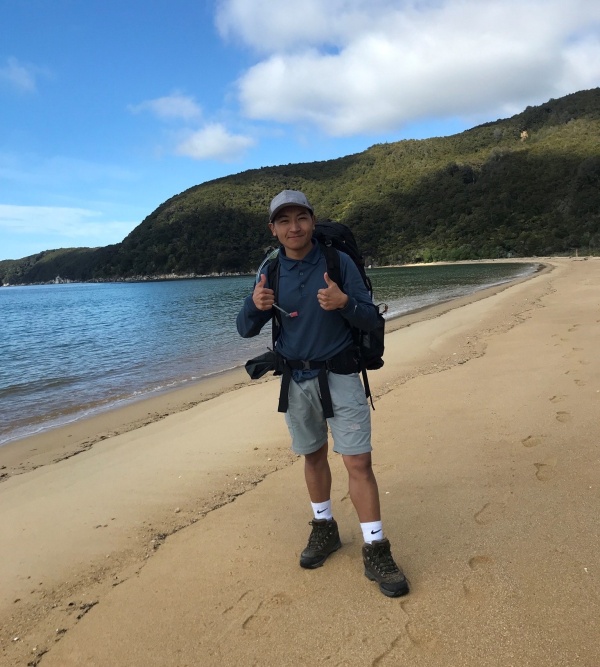
“I am a Sherpa. We are renowned as mountaineers, but we are also an ethnic tribe with a strong connection and respect for nature and a strong desire for environmental stewardship.
“Seeing Māori taking ownership of preserving and retaining their culture was an important learning for me. These are taonga (treasures) which we should be taking from one generation to another.
“Through my education I want to promote empowerment of local people on conservation issues,” Tsewang says. “Studying in New Zealand made me realise that this is already happening in Nepal, but we just need to find ways to make it more effective.”
Tsewang’s Master’s research was into the effectiveness of the Garbage Deposit Scheme (GDS) initiated by the Sherpa people, in which Everest climbers pay a US$4000 deposit that’s returned only if they bring back at least 8kg of rubbish produced during their expeditions. “Working in conjunction with the aims, aspirations, and opportunities of local communities is incredibly empowering.”
Making a positive impact in Nepal
The students who have come to Aotearoa have made a positive impact in Nepal, Tsewang says. “It’s all about learning from best practice and sharing knowledge.
As one person it’s hard to make change, but by sharing information and knowledge we can make incremental change.”
“We are seeing that governments globally are starting to overhaul their environmental protection policies. New Zealand has played a key role in the context of Nepal because people before me came to study and returned home to build crucial environmental education and awareness.”
Tsewang loved his time in Aotearoa, both inside and outside the classroom, having spent most of his free time hiking iconic tracks. “There’s so much learning that happens out in the field where you hear first-hand of the experiences of those working in conservation.
“This was an essential part of my education experience. You have unplanned conversations which are inspiring and hugely valuable,” he says.
“The last two years have been monumental in so many ways. It’s not just the academic learning, but also the personal growth. I have gained so much confidence to voice my opinion and share my knowledge.
“I will stay in touch with many of the people I have met and hopefully we will have the opportunity to collaborate in the future. Learning never stops.
“The international education opportunities with New Zealand only serve to strengthen the long-standing bond with Nepal. There’s a real legacy involved for both countries.”
-
Brazilian champions Māori world view to design students globally
So transformative was the experience, that the former international student is determined that design leaders globally learn from AUT’s success embracing Māori knowledge in tertiary design studies.
Marcos came from Sao Paulo to study for his PhD in Design at AUT in 2015. He always felt that Aotearoa was “calling” him and was drawn to the concept of practice-led research, which allows students to be assessed by their creative work alongside a supportive piece of writing.
“This means that your practice is your contribution to knowledge,” he says. “I was fascinated by the idea.”
Practice-led research has been around for many years but is still not widely used. AUT, now considered a world-leader in its implementation, developed the approach under education “disruptor” Professor Welby Ings, who believes thinking outside the box can be the key to success for many learners.
Embracing the natural world from a Māori perspective
While Marcos enjoyed the early months focusing on his photography, it was an introduction to respected Māori scholars Professor Hinematau McNeill and Professor Robert Pouwhare late in his first year which really rocked his world.
“They shared their love and knowledge and introduced me to Māori views of the natural world. Their way of thinking and seeing the world completely resonated with me. I understood how ignorant I was in terms of expecting to be able to explain the world through a Western perspective. I learned from them that there is so much beyond it that we cannot see.”
“I learned how the world can be seen from an indigenous perspective, and I felt really bad that my own culture has more than 300 indigenous tribes and we never learn anything about them.”
He says he became really connected with Māori epistemology (theory of knowledge) and committed to understand and incorporate Māori elements in a substantial part of his thesis. “I try my best to captivate the complex Māori concept of mauri (life force or essence) in my work.”
Incorporating the Māori view of the natural world in practice-led research is attracting and retaining students who might not otherwise thrive in a university environment, Marcos says.
At AUT’s Manukau campus, the majority of students are Māori and Pasifika. “These students have natural storytelling talents, and they love graphic design, photography, street art, and all forms of contra-culture expression (outside mainstream media).
Māori and Pasifika students feel sense of belonging
“They feel a sense of belonging to the university with this approach. ”Last year saw the biggest increase in the number of students continuing from undergraduate to postgraduate study in Communication Design, using the practice-led approach.
Driven to promote this diversity of thought and boost the status of indigenous cultures and language elsewhere, Marcos is using his connections in Brazil to share Aotearoa’s success with South America and beyond.
A former colleague, Professor Sérgio Nesteriuk Gallo, is now head of a postgraduate programme in Art and Design at Anhembi Morumbi University (UAM) in Sao Paulo where students are increasingly using practice-led methodologies. “We agreed when I left for New Zealand that the knowledge I gained in practice-led research we would share and promote in Brazil,” Marcos says.
“We promised we would create an event every year to build a body of knowledge about practice-led research into the future. I know that many people, especially those from an indigenous background in Latin America are keen to take up this form of research.”
The first symposium was held in 2016 and attracted 10 exhibitors. Last year’s online symposium drew in 400 submissions from 13 universities around the world.
Planning is underway to take 10 of the most influential Māori practice-led researchers to Brazil for this year’s conference in December, called LINK2022 Moana Crossing, where they will run a series of workshops and launch a special edition of the journal incorporating original manuscripts from the Māori scholars and from collaborative partnerships with non-Māori practitioners.
Aotearoa New Zealand leading the way
“We have at least half the leading scholars in this field,” Marcos says. “Sharing this knowledge will hopefully influence the approach of those who teach elsewhere in the world.”
The new model of undertaking research and presenting knowledge must be more considerate of alternative approaches. “Māori traditions can enhance our understanding of research, practice, and the intricate connection with te taiao (the environment).”
He says he is committed to elevating the practice-led approach connected to Māori and first-nation knowledge, “taking our thinking to the world and giving a voice to indigenous cultures elsewhere”.
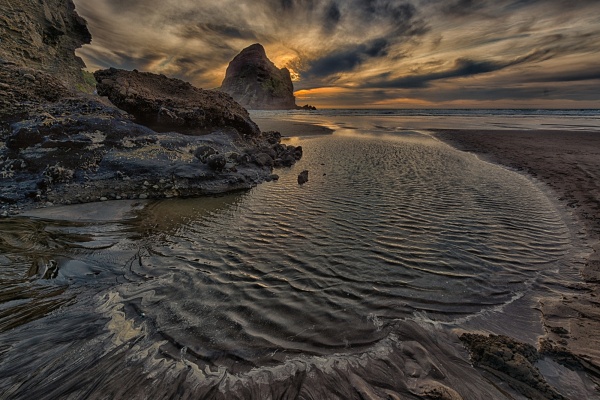
Piha at Sunset by Marcos Steagall.

